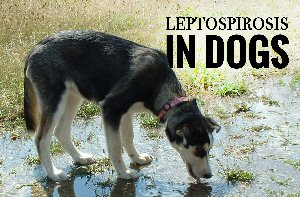| |
A re-emerging problem...
 While
this month's Working K-9 Vet column does not address a concern specific to agility dogs, the
information contained in it is of growing importance to all dogs, their owners and handlers, as
it speaks about a Leptospirosis. a growing health concern. While
this month's Working K-9 Vet column does not address a concern specific to agility dogs, the
information contained in it is of growing importance to all dogs, their owners and handlers, as
it speaks about a Leptospirosis. a growing health concern.
Q. My dog was recently diagnosed with
Leptospirosis. What is this disease and where would my dog have been exposed to it? My dog
never misses his annual vaccinations. Shouldn't
they have protected him?
A. Leptospirosis is considered to be a
re-emerging disease of companion animals. This disease has been recognized for over one hundred
years, and there has been an effective commercial vaccine available for approximately the last
thirty years. Until recently, the incidence of the disease was relatively low. However, in the
last eight to ten years the incidence of this disease has increased. In the last two to three
years it has been diagnosed with increasing frequency country wide, particularly in Alabama,
Georgia, Massachusetts, Michigan, New Jersey and New York.
Symptoms
This disease can cause an array
of clinical signs. The severity of the disease can vary widely but it has the potential to be
extremely severe, and in fact fatal. Symptoms are typical of kidney and/or liver disease, and
can include, fever, loss of appetite, muscle pain, dehydration, vomiting, diarrhea and
bleeding. Some dogs will have an increased water consumption and urine output while others may
have a decreasing output of urine. Jaundice may occur, and the dog may be painful in the
abdominal area or in the lower back. In extremely acute cases, a dog may suddenly go into shock
and succumb.
The course of this disease can be chronic
or extremely acute. Due in part to the fact that the symptoms in chronic cases can be vague as
well as the fact that it has not been a common disease for many years, the potential for
confusing the diagnosis with other diseases is possible.
Laboratory work is essential to
establishing the diagnosis of Leptospirosis. On a routine blood count and blood chemistry,
there are typically abnormalities that suggest kidney or liver disease. Diagnosing
Leptospirosis definitively however, depends on demonstrating the organism in urine or in kidney
or liver biopsy specimens. Antibody testing is also available, but early on in the course of
the disease the results can be difficult to evaluate with accuracy. Your veterinarian and the
testing laboratory can help guide you through the diagnostic challenge created by this disease.
Treatment
Once Leptospirosis is diagnosed,
treatment is undertaken with aggressive antibiotic therapy as well as supportive care. The
specifics of these therapies are dictated by the magnitude and duration of the disease as well
as what damage has been done to organ systems. Since Leptospirosis is infectious to humans,
strict sanitary precautions should be taken when handling blood, urine or stool of infected
animals. Also, infected dogs should be confined in such a way so as to avoid contact with other
dogs as well as those areas that children would play in such as playgrounds, sandboxes, ponds
or wading areas.
More about it
Understanding why this disease
has re-emerged requires some understanding of the organism itself as well as the manner in
which it is transmitted.
Leptosira is a bacteria of which there
are seven species that are pathogenic. Among these species there are more than 200 pathogenic
varieties (serovars), worldwide. Historically, in the United States, two varieties (canicola
and icterohaemorrhagiae) were primarily responsible for the disease in dogs. The incidence of
infection from these two has declined over the past thirty years most likely due in large
measure to vaccination. The increase in cases most recently has been due primarily to the
varieties pomona and grippotyphosa. Until recently no vaccine for these varieties was
available, and vaccination for canicola and icterohaemorrhagiae does not protect dogs from
pomona and grippotyphosa.
Leptospira varieties have what are termed
maintenance hosts and incidental hosts. Maintenance hosts are those animal species which serve
as a reservoir for the Leptospira organism, and in which transmission is very efficient.
Incidental hosts include those species of animals that do not act as reservoirs, but that can
be infected by the organism. The organism replicates in the kidneys of maintenance hosts and is
shed in the urine. In warm damp environments the organism can survive for months in water or
soil. Transmission can occur to the new host, either maintenance or incidental, by coming in
contact with contaminated water, soil or the carcass of an infected animal. Given the fact that
maintenance hosts for pomona and grippotyphosa include skunks, opossums, raccoons and small
rodents it is easy to see how our dogs could readily be exposed to this organism when they swim
or run in wooded areas or parks.
Prevention is the best form of
defence
Prevention of this disease
clearly is preferable to treating it, and there is now a vaccine that protects against all the
common varieties of Leptospira. For those of us in areas, or travelling into areas where there
have been outbreaks, vaccination should be a consideration. If you are unaware of the magnitude
of the problem in your area, a call to your regular veterinarian or possibly your state
veterinarian may be an appropriate step to take to assess your dogs risk level.
 About
the author... About
the author...
Dr. Henry De Boer is the Working K-9 Vet. Following his 1973 graduation from Cornell
University, he established Pioneer Valley Veterinary Hospital, based in western Massachusetts.
His involvement with working dogs dates to the mid-1960ís
when he began training and handling hunting dogs. In 1984 he became involved with the sport of
Schutzhund and has gradually risen to the level of national competitor.
Through the years. De Boer has worked both in a training
and veterinary capacity with a wide variety of working dogs. His knowledge and enthusiasm for
working dogs led to the establishment of Working K-9 Veterinary Consultation Services. This
service provides veterinary consultations for working canines and is available by phone, fax,
or email. Tel/fax: (+001) 802-254 1015. Or visit http://www.workingk-9vet.com
| |
|